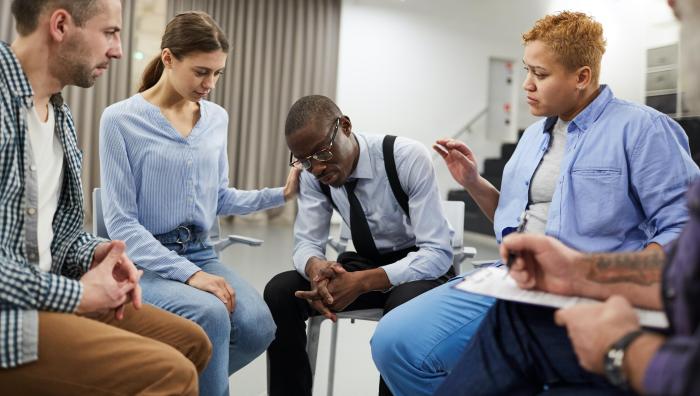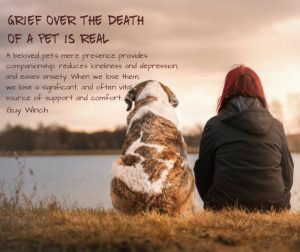
Grief support groups for loss provide a vital lifeline for individuals navigating the complexities of bereavement. These groups offer a safe and supportive environment where individuals can share their experiences, learn coping mechanisms, and connect with others who understand their pain. Whether in-person or online, these groups offer diverse models catering to specific needs, from the loss of a spouse to the death of a child, fostering a sense of community and shared healing.
This exploration delves into the various types of grief support groups, the process of finding and joining one, the roles of facilitators and participants, and the benefits and challenges involved. We’ll examine coping mechanisms and resources available, alongside illustrative examples of both positive and challenging group experiences, offering a comprehensive understanding of this crucial support system.
Types of Grief Support Groups

Grief support groups offer a vital lifeline for individuals navigating the complexities of loss. They provide a safe and empathetic space to share experiences, process emotions, and find comfort in shared understanding. The structure and focus of these groups can vary significantly, catering to diverse needs and preferences.
Different models of grief support groups exist, each with its own advantages and disadvantages. Choosing the right group can be a crucial step in the healing process.
In-Person Grief Support Groups
In-person groups offer the benefit of direct interaction and a strong sense of community. Participants can build relationships, engage in nonverbal communication, and experience the tangible support of others in a shared physical space. These groups often foster a deeper connection due to the face-to-face interaction. However, geographical limitations and scheduling conflicts can pose challenges for participation.
Online Grief Support Groups, Grief support groups for loss
Online groups provide accessibility and convenience, eliminating geographical barriers and offering flexibility in scheduling. These groups can be particularly beneficial for individuals with mobility limitations, those in rural areas, or those who prefer the anonymity afforded by online interaction. However, the lack of face-to-face interaction can sometimes limit the depth of connection and may not be suitable for all individuals.
Faith-Based Grief Support Groups
Faith-based groups integrate spiritual and religious beliefs into the grieving process. They provide comfort and solace through shared faith and offer a framework for understanding loss within a religious context. These groups can be particularly helpful for individuals who find strength and meaning in their faith. However, they may not be inclusive of individuals with diverse religious or spiritual beliefs.
Grief Support Groups for Specific Loss Types
Specialized groups cater to individuals grieving specific types of loss, such as the death of a child, spouse, or parent. These groups offer a unique understanding and shared experience that can be particularly valuable during the grieving process. The shared understanding of the specific type of loss creates a deeper connection among participants. For example, a group for bereaved parents would focus on the unique challenges and emotions associated with losing a child, while a group for those who lost a spouse would address the complexities of navigating life alone after the loss of a partner.
| Type of Group | Advantages | Disadvantages | Best Suited For |
|---|---|---|---|
| In-Person | Stronger community, direct interaction, nonverbal communication | Geographical limitations, scheduling conflicts | Individuals who thrive in face-to-face settings and prefer a strong sense of community. |
| Online | Accessibility, convenience, flexibility | Lack of face-to-face interaction, potential for less depth of connection | Individuals with mobility issues, those in rural areas, or those who prefer anonymity. |
| Faith-Based | Spiritual comfort, shared beliefs, religious framework | May not be inclusive of diverse beliefs | Individuals who find strength and meaning in their faith. |
| Specific Loss Type | Shared understanding, deeper connection, specialized support | May be difficult to find a group that specifically addresses a unique loss | Individuals grieving specific types of loss (e.g., child, spouse, parent). |
Unique Needs Catered to by Specialized Groups
Specialized grief support groups recognize that the grieving process is profoundly shaped by the nature of the loss. For example, a group for bereaved parents will address the unique emotional trauma and societal expectations associated with losing a child. Similarly, a group for those who lost a spouse will explore the challenges of navigating significant life changes, such as financial adjustments and social isolation, alongside the emotional pain of loss.
These specialized groups provide a space for sharing experiences that are deeply understood by others who have walked a similar path.
Finding and Joining a Grief Support Group: Grief Support Groups For Loss

Finding a grief support group that fits your needs can be a significant step in your healing journey. Many resources are available to help you locate groups and understand the process of joining. This section will guide you through the process, from identifying potential groups to understanding group dynamics.
Locating a grief support group involves several avenues, depending on your preferences and location. Online resources provide broad access, while local organizations offer a more personal touch.
Resources for Locating Grief Support Groups
Several online directories list grief support groups across various geographic locations. Websites such as the Association for Death Education and Counseling (ADEC) and the Hospice Foundation of America may have searchable databases or links to relevant organizations in your area. Additionally, searching online using terms like “grief support group [your city/state]” can yield local results. Many hospice organizations also offer grief support groups, both in-person and online, often at no cost or for a low fee.
Check with your local hospice or palliative care provider for information on available groups. Some faith-based organizations and community centers also host grief support groups.
Steps Involved in Joining a Grief Support Group
Joining a grief support group typically involves several steps. First, you’ll need to contact the group organizer or facilitator. This often involves a simple phone call, email, or online form submission. The next step is attending an initial meeting. Many groups offer introductory sessions or allow you to observe a meeting before committing.
This allows you to gauge the group’s dynamics, the facilitator’s style, and whether the group feels like a good fit for you. Finally, understanding group dynamics is crucial. Grief support groups operate under various formats, from structured sessions with specific activities to more open and informal discussions. It’s important to be respectful of others’ experiences and to participate in a way that feels comfortable for you.
Questions to Consider When Choosing a Grief Support Group
Choosing the right grief support group is a personal decision. Consider several factors before joining.
A checklist of important considerations can help you make an informed choice. These factors will help ensure the group aligns with your needs and preferences.
- Group Size: Do you prefer a smaller, more intimate group or a larger group with more diverse perspectives?
- Meeting Frequency: How often do the meetings occur? Does this frequency align with your schedule and needs?
- Leadership Style: What is the facilitator’s approach? Is it structured or more open-ended? Does their style resonate with you?
- Group Focus: Does the group focus on a specific type of loss (e.g., loss of a child, loss of a spouse) or is it open to all types of grief?
- Location and Format: Is the group in-person or online? Is the location convenient for you to attend?
- Cost: Are there any fees associated with joining the group?
- Member Confidentiality: Does the group maintain a policy of confidentiality to ensure a safe and trusting environment?
The Role of Facilitators and Group Members
Grief support groups rely heavily on the collaborative efforts of both facilitators and group members to create a safe and supportive environment for healing. The effectiveness of the group hinges on the skilled facilitation and the active participation of individuals sharing their experiences. A well-functioning group fosters mutual understanding, validation, and hope.
Facilitator Qualities and Responsibilities
Effective grief support group facilitators possess a unique blend of professional skills and personal qualities. They are trained professionals, often social workers, counselors, or clergy, equipped to manage the complexities of grief and loss. Crucially, they understand the diverse ways individuals grieve and avoid imposing any single “correct” way of coping. Their responsibilities extend to creating a structured yet flexible environment, setting clear ground rules, ensuring confidentiality, and actively managing group dynamics to prevent unhealthy power imbalances or conflict.
Facilitators also need to be adept at identifying individuals who may require additional support or professional intervention beyond the group setting. For instance, a facilitator might recognize signs of suicidal ideation in a participant and connect them with appropriate mental health resources. They are also responsible for guiding discussions in a productive direction, ensuring all members feel heard and respected, and promoting a sense of shared experience and mutual support.
Healthy Group Interaction and Communication
Healthy group interaction within a grief support setting is characterized by empathy, active listening, and respect for individual experiences. Members are encouraged to share their feelings and perspectives openly, but without judgment or pressure. Constructive feedback and support are provided within a framework of emotional safety. Effective communication involves active listening, where individuals demonstrate genuine interest in what others are sharing, rather than just waiting for their turn to speak.
Nonverbal cues like eye contact, nodding, and appropriate body language play a vital role in showing empathy and engagement. Furthermore, healthy group dynamics are characterized by a balance of sharing and listening, with members respecting the emotional space of others and avoiding interrupting or dominating conversations. This balanced environment allows for vulnerability and connection, essential components of the healing process.
Roles of Group Members in Mutual Support
Group members play a crucial role in creating a supportive environment for one another. Several key roles emerge naturally within a well-functioning group. Active listeners provide empathetic presence, offering validation and understanding through attentive listening and nonverbal cues. Empathetic sharers offer their own experiences to normalize feelings and demonstrate that they are not alone in their grief.
This shared experience can be incredibly powerful in reducing feelings of isolation. Resource providers may share information about helpful resources such as bereavement counseling, support hotlines, or community programs. Another important role is that of the encourager, who offers words of comfort, hope, and support to other group members. This role helps to build a positive and uplifting atmosphere within the group.
Finally, some members may act as a mediator, helping to resolve conflicts or disagreements that may arise within the group, ensuring the overall supportive environment is maintained.
Benefits and Challenges of Grief Support Groups
Grief support groups offer a unique space for individuals navigating the complexities of loss. While participation can be profoundly beneficial, it’s important to acknowledge potential challenges to ensure a positive and supportive experience for all involved. Understanding both the advantages and drawbacks allows for informed participation and effective strategies for managing difficulties.Participating in a grief support group provides a multitude of psychological and emotional benefits.
The shared experience of loss fosters a sense of community and belonging, reducing feelings of isolation that often accompany grief. This shared understanding allows individuals to feel less alone in their pain, validating their emotions and experiences. The opportunity to express feelings openly and honestly, without judgment, can be incredibly cathartic, leading to emotional release and a sense of relief.
Furthermore, learning coping mechanisms and strategies from others in the group can provide practical tools for navigating grief’s challenges. The support and encouragement received from fellow group members can significantly enhance self-esteem and resilience.
Psychological and Emotional Benefits of Grief Support Groups
The benefits extend beyond immediate emotional relief. Many individuals find that participating in a support group helps them process their grief in a healthy way, facilitating the transition through the various stages of mourning. Hearing others share their experiences can help normalize the often-intense and unpredictable emotions associated with loss. This normalization can reduce feelings of shame or guilt that some individuals may experience.
Moreover, the group setting offers a safe space for exploring different aspects of grief, including anger, guilt, and even acceptance, fostering a sense of emotional regulation and self-understanding. The development of new coping mechanisms and strategies, shared within the group, can provide long-term support for navigating future challenges. The increased self-awareness and improved emotional regulation resulting from participation can contribute to overall improved mental well-being.
Potential Challenges in Grief Support Groups
While the benefits are substantial, participation in a grief support group also presents potential challenges. The emotional intensity of the group setting can be overwhelming for some individuals, particularly those who are new to the grieving process or who are experiencing particularly intense emotions. The sharing of personal stories and experiences can trigger painful memories and emotions, leading to emotional distress or even flashbacks.
The group dynamic itself can also pose challenges. Personality clashes, differing coping styles, or even unspoken power dynamics can create discomfort or conflict within the group. Some individuals might struggle with the vulnerability required to fully participate, leading to feelings of isolation or inadequacy within the group. Additionally, the group may inadvertently trigger comparisons or judgments, adding to the emotional burden for participants.
Strategies for Overcoming Challenges in Grief Support Groups
Addressing these challenges requires proactive strategies. For individuals experiencing overwhelming emotional intensity, it’s important to remember that it’s perfectly acceptable to take breaks or step back from the group when needed. Communicating these needs to the facilitator is crucial for ensuring a supportive environment. Mindfulness techniques, such as deep breathing or meditation, can help manage intense emotions during group sessions.
If triggering memories or flashbacks occur, it’s essential to have a support system outside the group, including family, friends, or a therapist, to help process these experiences. To address group dynamic issues, open and honest communication is key. Expressing concerns to the facilitator or other group members in a respectful manner can help resolve conflicts and foster a more positive group environment.
For those struggling with vulnerability, it’s important to remember that everyone in the group is sharing a similar experience. Starting with smaller contributions and gradually increasing participation can help build confidence and comfort within the group setting. Ultimately, utilizing available resources, both within and outside the group, is crucial for maximizing the benefits and mitigating the challenges of grief support.
Death and Dying
Facing the death of a loved one or confronting one’s own mortality is a profoundly challenging experience. It evokes a wide range of intense emotions and necessitates the development of effective coping strategies. Understanding the common responses to death and dying, as well as available coping mechanisms and support systems, is crucial for navigating this difficult period.
Emotional and Psychological Responses to Death and Dying
The emotional and psychological impact of death and dying is highly individual, varying based on factors such as the nature of the loss, the individual’s personality, and their prior experiences with grief. Common responses include intense sadness, anger, guilt, anxiety, and denial. Individuals may also experience physical symptoms like fatigue, sleep disturbances, changes in appetite, and difficulty concentrating.
These reactions are normal parts of the grieving process and shouldn’t be viewed as signs of weakness or pathology. The intensity and duration of these feelings can vary greatly, and seeking professional help is often beneficial in managing them.
Coping Mechanisms for Grief and Loss
Individuals employ various coping mechanisms to manage their grief and loss. These strategies can be broadly categorized into emotional, behavioral, and cognitive approaches. Emotional coping involves acknowledging and expressing feelings, whether through tears, talking, or creative outlets. Behavioral coping mechanisms include engaging in activities that provide comfort or distraction, such as spending time in nature, listening to music, or exercising.
Cognitive coping strategies involve reframing thoughts and perspectives to find meaning in loss or accepting the reality of the situation. Examples include journaling, which allows for processing emotions through writing, and mindfulness practices, which promote present moment awareness and reduce rumination.
The Importance of Professional Support for Grief
While many individuals find solace in self-help strategies and support from loved ones, seeking professional support is often invaluable in navigating the complexities of grief. Therapy or counseling provides a safe and confidential space to explore emotions, develop healthy coping mechanisms, and process the trauma associated with loss. A therapist can help individuals identify unhelpful patterns of thinking and behavior, address underlying mental health concerns that may be exacerbated by grief, and develop strategies for long-term emotional well-being.
Grief counseling can be particularly beneficial for individuals struggling with complicated grief, which involves prolonged and debilitating symptoms that interfere with daily functioning.
Resources for Grief Support
Accessing support during the grieving process is essential for healing and well-being. Numerous resources are available to provide guidance and assistance.
- Helplines: Many organizations offer confidential helplines staffed by trained professionals who provide emotional support and information. These helplines can be particularly helpful during times of crisis or when immediate support is needed.
- Online Resources: Websites and online communities offer valuable information about grief, coping strategies, and support groups. These platforms provide a sense of connection with others who understand the grieving process.
- Grief Counseling Services: Many therapists and counselors specialize in grief counseling and offer individual or group therapy to help individuals process their loss and develop healthy coping mechanisms.
- Support Groups: Joining a grief support group can provide a sense of community and shared experience. These groups offer a safe space to express emotions, share stories, and learn from others navigating similar challenges.
- Hospice and Palliative Care Organizations: These organizations provide support for individuals facing life-limiting illnesses and their families, offering resources and guidance throughout the dying process and bereavement period.
Illustrative Examples of Grief Support Group Experiences
Grief support groups offer a unique space for individuals navigating loss. The shared experience and mutual support can significantly impact the healing process, though challenges can also arise. The following examples illustrate both the positive and negative aspects of participation.
Positive Impact of a Grief Support Group
Sarah, a 42-year-old accountant, recently lost her husband, Mark, to a sudden heart attack. Overwhelmed by grief and struggling to cope with the practicalities of life without him, she felt isolated and alone. Friends and family offered sympathy, but Sarah found it difficult to articulate the depth of her pain and the complexities of her grief. Joining a grief support group proved to be a turning point.
The group provided a safe space for Sarah to express her raw emotions without judgment. She listened to others share their experiences of loss, finding comfort in the shared understanding and realizing she wasn’t alone in her suffering. One particularly impactful moment involved another member, David, sharing his experience of losing his wife to a similar illness years prior.
David’s story, while painful, resonated deeply with Sarah; his description of the stages of grief and his eventual journey towards acceptance offered a glimmer of hope. The group also offered practical advice, from navigating legal matters to managing finances, easing some of Sarah’s burdens. Through active listening, validation, and the shared experience, Sarah felt a sense of community and belonging, gradually finding her way towards healing and acceptance.
Her participation fostered a renewed sense of purpose and a path towards rebuilding her life.
Challenge Encountered Within a Grief Support Group and its Resolution
A group focusing on the loss of children encountered a significant challenge when a new member, Emily, expressed intense anger and resentment towards the group facilitator, believing the facilitator wasn’t adequately addressing the specific trauma of losing a child. Emily felt her grief was being minimized compared to others’ experiences, and she voiced her frustration loudly, interrupting other members and causing a tense atmosphere.
The facilitator, initially taken aback, handled the situation with empathy and professionalism. She acknowledged Emily’s feelings, validating her pain and anger, explaining that the group aimed to provide a space for diverse expressions of grief. The facilitator then facilitated a discussion amongst the group members, allowing them to address Emily’s concerns respectfully. Other members shared their experiences of feeling misunderstood or unheard at times, creating a sense of shared vulnerability and empathy.
Emily, seeing that her feelings weren’t unique and that the facilitator was actively trying to address her concerns, began to calm down. The group agreed to dedicate some time in future sessions to focus specifically on the unique challenges of losing a child, and the facilitator committed to offering more individualized support. The subsequent sessions showed improved communication and a more cohesive group dynamic, demonstrating the importance of open communication and addressing conflict constructively within a support group setting.
Ultimately, navigating grief is a deeply personal journey, and grief support groups offer an invaluable resource for those seeking solace, understanding, and a path towards healing. By understanding the various models available, the process of joining a group, and the dynamics within, individuals can make informed choices and harness the power of shared experience to navigate their grief effectively. Remember, seeking support is a sign of strength, and these groups provide a vital community for those in need.
Essential FAQs
How long do grief support groups typically last?
The duration varies greatly depending on the group’s focus and structure. Some groups are open-ended, while others run for a set number of weeks or months.
Is there a cost associated with joining a grief support group?
Costs vary widely. Some groups are free, while others may charge a fee, depending on their funding and resources. Many hospice organizations offer free groups.
What if I’m not ready to share my story in a group setting?
Many groups understand that participation is a personal choice. You are not obligated to share more than you are comfortable with. Simply listening and observing can be beneficial.
Are grief support groups only for people who have recently experienced a loss?
No, groups often welcome individuals who have experienced loss at any point in their lives, even years prior. The experience of grief can resurface at different times.






